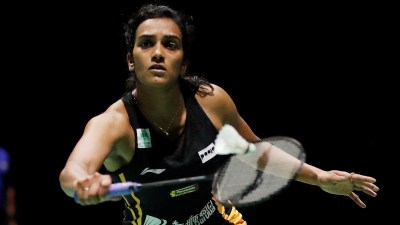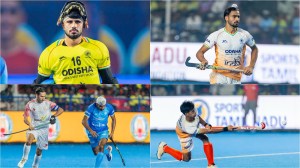Nine men get life in jail: What was the Pollachi sexual assault and blackmail case
Pollachi sexual assault case: How did the Pollachi sexual assault cases come to light? How were the accused finally brought to book? Here's the story of the crime that rocked Tamil Nadu in 2019.
 Pollachi sexual assault case: Special Public Prosecutor at Mahila court Disha speaks to the media after hearing in the Pollachi sexual assault case, in Coimbatore, Tamil Nadu, Tuesday, May 13. (Photo: PTI)
Pollachi sexual assault case: Special Public Prosecutor at Mahila court Disha speaks to the media after hearing in the Pollachi sexual assault case, in Coimbatore, Tamil Nadu, Tuesday, May 13. (Photo: PTI)Pollachi sexual assault case: In a ruling that marked the culmination of a long legal battle, a special Mahila Court in Coimbatore on May 13 sentenced nine men to life imprisonment till death in the infamous Pollachi sexual assault and extortion case.
The verdict comes six years after the scandal surfaced, just ahead of the 2019 Lok Sabha elections, setting off legal, political, and social reverberations that still echo in Tamil Nadu.
What was the Pollachi case about?
A group of young men from Pollachi, a tranquil town in Coimbatore district, between 2016 and 2018 systematically lured, sexually assaulted, and blackmailed multiple women using footage of the crimes.
The gang used Facebook and other social media platforms to befriend women—often through fake female profiles—and coax them into meeting in person. Once isolated, the women were sexually assaulted, often inside moving cars or at a farmhouse near Aanamalai, and the acts were recorded on mobile phones. These videos were later used to blackmail the victims for further sexual favours or money.
The crimes came to light in February 2019, when a 19-year-old college student filed a complaint with the Pollachi East Police after being assaulted by four men in a car. Her brother had initially filed a complaint after being beaten up by the accused for confronting them. The victim’s statement revealed that the group had robbed her of a gold chain and threatened her with video footage of the assault.
How many victims were there?
While the complaint by the 19-year-old triggered the investigation, it was soon discovered that she was only one of many victims. Police retrieved mobile phones and laptops from the accused and uncovered dozens of videos showing assaults on women from across Tamil Nadu—students, teachers, professionals, and even schoolgirls. Although investigators suspect there were scores of victims, the social stigma led only eight survivors to testify in court.
When did the case reach court and how long was the trial?
The initial investigation was handled by the local police, but following massive public outrage and protests, the Tamil Nadu government transferred the case to the CB-CID on March 12, 2019, and subsequently to the Central Bureau of Investigation (CBI) on April 25, 2019. The final chargesheet was filed in May 2019.
Trial proceedings began only in February 2023, following a Madras High Court order to shift the case to a special courtroom inside the Coimbatore Combined Court Complex. Given the sensitivity, the courtroom included one-way glass partitions and other witness protection protocols to shield the survivors’ identities. Over 40 witnesses were examined during the trial. The CBI Special Public Prosecutor, V Surendra Mohan, was commended by the court for handling the case sensitively, even arranging counselors to help the survivors gain confidence to testify.
Why did it become a political flashpoint?
The case broke just weeks before the 2019 general elections, triggering a political storm. Two of the accused—K Arulanandham and A Nagaraj—were AIADMK functionaries. Arulanandham was the Pollachi town students’ wing secretary, while Nagaraj was associated with the AIADMK’s youth wing. Both were expelled from the party after their arrests, but the damage was done.
The opposition DMK accused the ruling AIADMK of shielding the accused and alleged deeper links between party leaders and the perpetrators. The controversy intensified when the Tamil Nadu Home Department’s order transferring the case to the CBI ended up disclosing the name of the survivor, her college, and her brother—an egregious violation of privacy that drew condemnation from across the political spectrum. Retired Justice K Chandru called the lapse “unforgivable.”
AIADMK leaders Edappadi K Palaniswami and O Panneerselvam, then Chief Minister and Deputy Chief Minister respectively, rushed to contain the fallout by publicly announcing the expulsion of the accused and pledging full cooperation with the CBI.
What did the court find?
On May 13, the Mahila Court found all nine men guilty under multiple IPC sections, including 376D (gang rape) and 376(2)(n) (repeated rape on the same woman), criminal intimidation, and conspiracy. The court sentenced them to life imprisonment until death and directed Rs 85 lakh in compensation to the eight survivors, to be paid through the District Legal Services Authority. Each convict was also fined.
- 01
- 02
- 03
- 04
- 05





































